Table of Contents
- What is a salvage title?
- Salvage vs. rebuilt title
- How to obtain a salvage title?
- What happens to a car after its title has been branded as salvage?
- Removing salvage titles
- Reasons why a vehicle can be totaled
- How much does a salvage title devalue a car?
- Can you insure a car with a salvage title?
- What are the risks of buying a car with a salvage title?
- How to know if a car has a salvage title?
- Should you buy a salvage car? The risks and benefits
- Buying a used car? Learn about its past to avoid issues
- Check the car’s history
- Ask for original service records
- Inspect a salvage title vehicle
- What if you buy a salvage car without knowing it?
Understanding salvage titles: A comprehensive overview
A car with a salvage title can spark both curiosity and concern. It depends on whether you’re just into cars and their stories or are seriously considering buying that specific vehicle.
Is having a salvage title the end of the road for a car, or can it still have a future?
Let’s find out in this blog post.

Afraid of buying a wreck?
Check any VIN to learn a vehicle's history!
What is a salvage title?
A salvage title is a type of car title branding that indicates the vehicle has been damaged to the point where its repair costs exceed, or nearly exceed, its current market value. This mostly happens after severe road accidents. However, events like floods and fires can also cause significant damage, resulting in a salvage title.
A car title (a legal document that shows who owns a vehicle) typically gets a salvage title brand after an insurance company assesses a damaged car and declares it a total loss. This type of car is also referred to as a “totaled” car. What constitutes a total loss depends on the laws governing salvage titles in each state, yet they all lead to the same conclusion – a car cannot be driven or registered in its current condition.
The approach to salvage titles is not uniform across the US. In some states, a salvage brand means the car's title is permanently canceled, so the vehicle can only be dismantled or scrapped. In other states, if a car can be properly repaired, it may qualify for a new title, commonly called a rebuilt title.
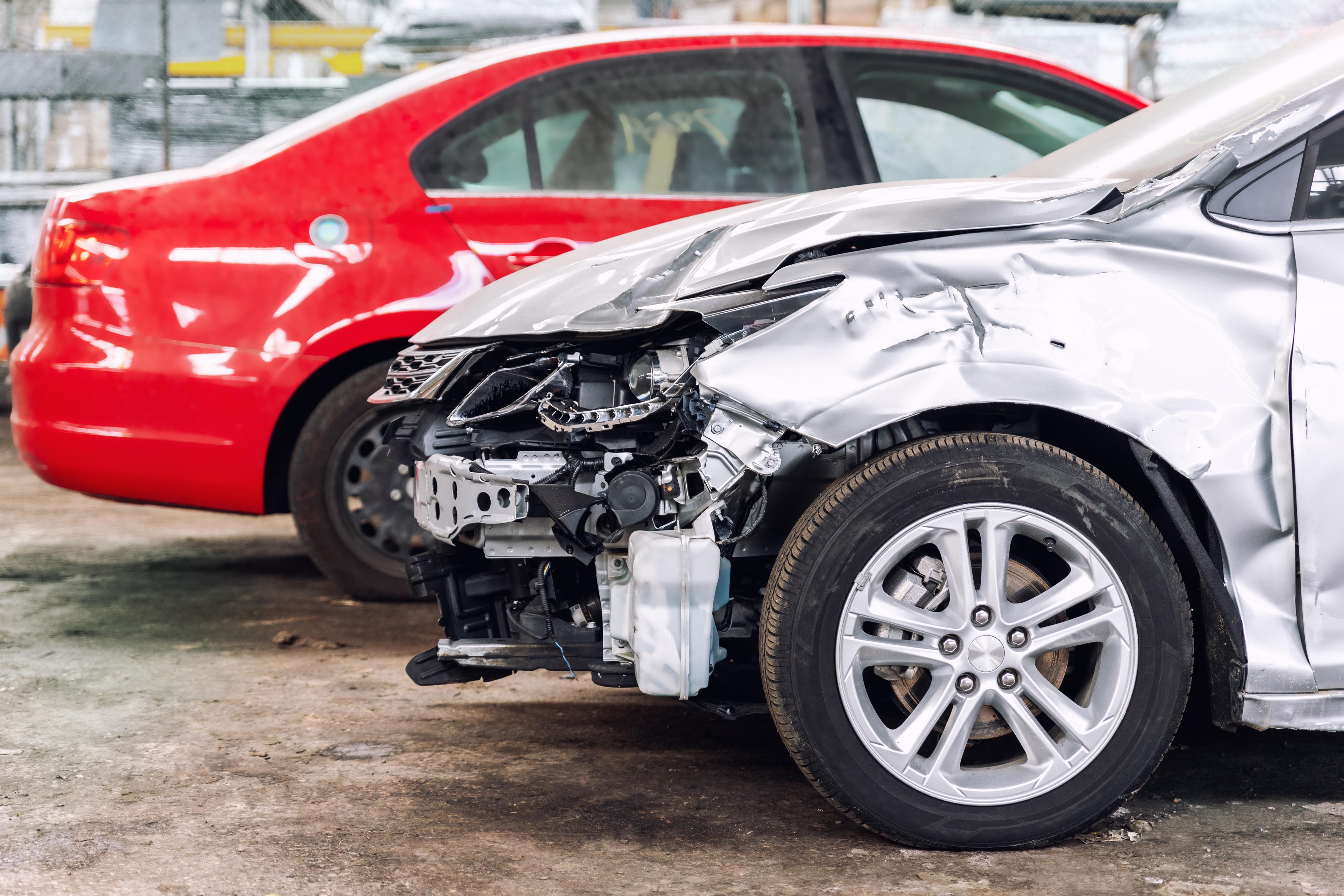
Salvage vs. rebuilt title
While salvage titles are often seen when shopping for a used car, they do not allow you to register the vehicle again (although specific regulations can vary by state). Bringing a salvaged car back on the road is generally possible only after it is restored to a safe condition and receives a new, rebuilt title.
A rebuilt title indicates that the vehicle was once deemed a total loss due to severe damage but has been repaired and thoroughly inspected by relevant authorities to ensure it meets all safety requirements.
How to obtain a salvage title?
Salvage titles can be obtained by submitting the necessary paperwork to the government authority responsible for vehicle registration and title. Depending on the location, this authority can be known as the Department of Motor Vehicles, Division of Motor Vehicles, Driver and Motor Vehicle Services, or similar.
Who applies for a salvage title depends on who takes possession of the vehicle declared a total loss. Therefore, it’s either the owner, the lienholder, or the insurance company.
What happens to a car after its title has been branded as salvage?
When the insurance company or lienholder repossesses the salvaged vehicle, it typically sells it to an auction house or repair facility. If you decide to repair the car yourself, you can do so at your own expense.
If the vehicle is damaged beyond repair, the owner should apply for a junk or non-repairable vehicle certificate, which means that the car can only be used for parts or scrap metal.

Removing salvage titles
Salvage titles cannot be restored to clean titles. If the vehicle is totaled, a salvage title becomes part of its title history and cannot be removed.
However, in most states, you can reclassify a salvage titled car as a “rebuilt title” car if you repair the vehicle to meet safety standards, pass a series of inspections, and file the necessary paperwork.
Reasons why a vehicle can be totaled
Severe damage from collisions is not the sole cause for a vehicle “earning” a salvage title. Depending on a state, there may be different types of salvage brands that can be assigned to a vehicle's title based on the nature and extent of the damage.
For example, in Massachusetts, a salvage title requires a primary and secondary brands. While the primary brand indicates that the car has a salvage title, the secondary brand describes the type of damage or event that caused a vehicle to be totaled.
Overall, a car can be declared a total loss due to various reasons, including:
- Flood damage. Vehicles affected by water, whether from natural disasters like hurricanes or floods or internal issues like a leaking roof or broken seals, may be totaled, as it can damage critical car components and systems.
- Fire damage. Vehicles damaged by fire may be considered totaled if the damage is extensive and affects the vehicle's structural integrity or safety systems.
- Hail damage. Severe hail storms can cause damage to a vehicle's body, windows, and exterior components.
- Riots and vandalism. Extensive damage resulting from vandalism during riots (e.g., arson) can lead to a vehicle being totaled if the cost of repairs outweighs its value.
- Manufacturer recall. In some cases, car recalls may be the reason why a vehicle gets a salvage title. This can happen if the necessary repairs are extensive or the parts required are unavailable or cost-prohibitive.
How much does a salvage title devalue a car?
A salvage title can devalue a car by between 20% and 40%, according to the Kelley Blue Book. However, this can vary widely depending on factors such as the severity of damage, the vehicle’s make and model, model year, and the local market conditions.
Keep in mind that the negative effect of a salvage title is permanent. This means that even after all the needed repairs, it may not be possible to fully restore a salvaged car to its pre-accident condition. Moreover, such vehicles may be perceived as having a higher risk of lingering safety issues, so buyers may avoid purchasing them.
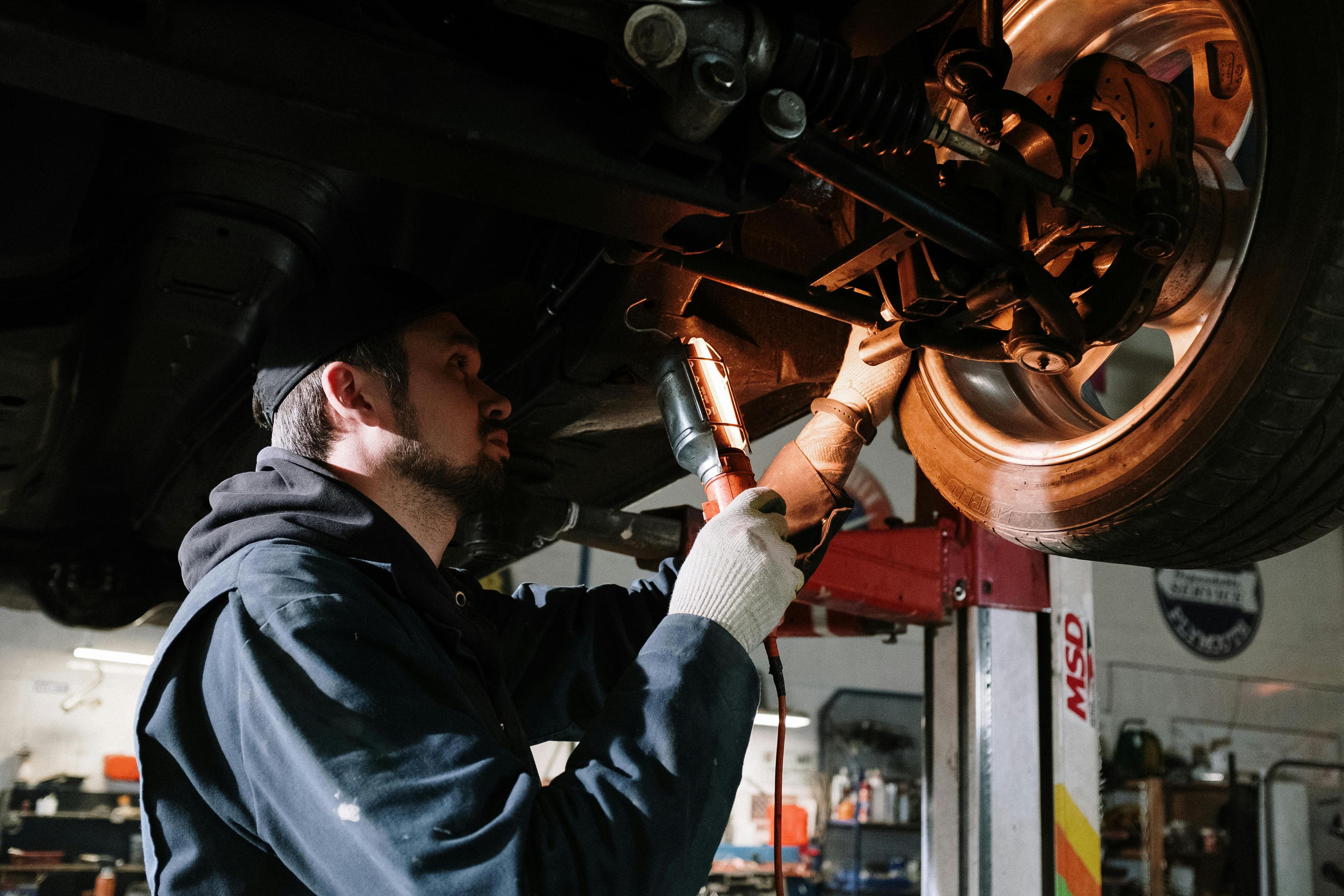
Can you insure a car with a salvage title?
You can’t insure a car with a salvage title because it hasn’t been repaired and can’t be legally driven on the road. You can get coverage on a previously salvaged car, though, if you have it fixed and receive a rebuilt title.
Even then, insuring such a car can be challenging.
Insurers often view salvage and rebuilt title vehicles as higher risk due to their history of significant damage. Since there are no set standards for salvage car repairs, it’s difficult for them to determine the quality of previous work. Insurers perceive salvage cars as more susceptible to breaking, making the owner more likely to claim any damage.
Therefore, most insurance companies allow liability coverage for a rebuilt title car, but they may often exclude optional coverage like collision or comprehensive insurance. Moreover, due to potentially lingering issues, insurers may charge higher premiums to compensate for the increased likelihood of future claims.
It’s not completely hopeless, though. If you want better coverage, make sure to contact several insurance companies, provide them with the necessary information, and one of them may still offer something you can be happy with.
What are the risks of buying a car with a salvage title?
While the lower price is always appealing, buying a car with a salvage title does come with significant risks:
- Safety issues. Salvage vehicles got this title because of significant damage in the past, and the fact that they’re being sold doesn’t guarantee proper repairs. Naturally, stepping into such a car may still be unsafe.
- Limited financing options. Lenders are usually reluctant to finance salvage title vehicles, or they may offer less favorable loan terms compared to cars with clean titles. This could potentially increase the overall cost of purchasing the vehicle.
- Challenges selling or trading a salvaged car. A salvage title can be repelling for both dealerships and private buyers, as they will likely want to avoid a low-value vehicle and the higher risks associated with it.
- More frequent repairs. Due to its damage history, buying a car with a salvage title can result in higher maintenance costs. Unless you know a reliable mechanic to inspect it, you can never be 100% sure of how well repairs were handled in the past.
How to know if a car has a salvage title?
There are a few ways to learn whether the car has a salvage title:
- Check the title document. The most straightforward way to find out if a car has a salvage title is to examine the title document itself. It will typically indicate if the vehicle has a salvage or rebuilt title status.
- Check with the government authority or tag agency. These agencies maintain records of vehicle titles, therefore, you can inquire about a vehicle’s title status by providing its VIN number. Some states also offer online services that allow you to check the title status using a VIN or license plate number.
- Get a vehicle history report. Alongside other important information about a car, you will be able to see if it has a salvage or rebuilt title.
- Ask the seller. If you're purchasing the vehicle from a private seller or dealership, ask them about its title status directly.
Should you buy a salvage car? The risks and benefits
Generally, buying a salvage title car is not recommended due to potential safety issues, difficulties financing and insuring such a car, and low resale value. However, whether you should buy a salvage car ultimately depends on individual circumstances and preferences.
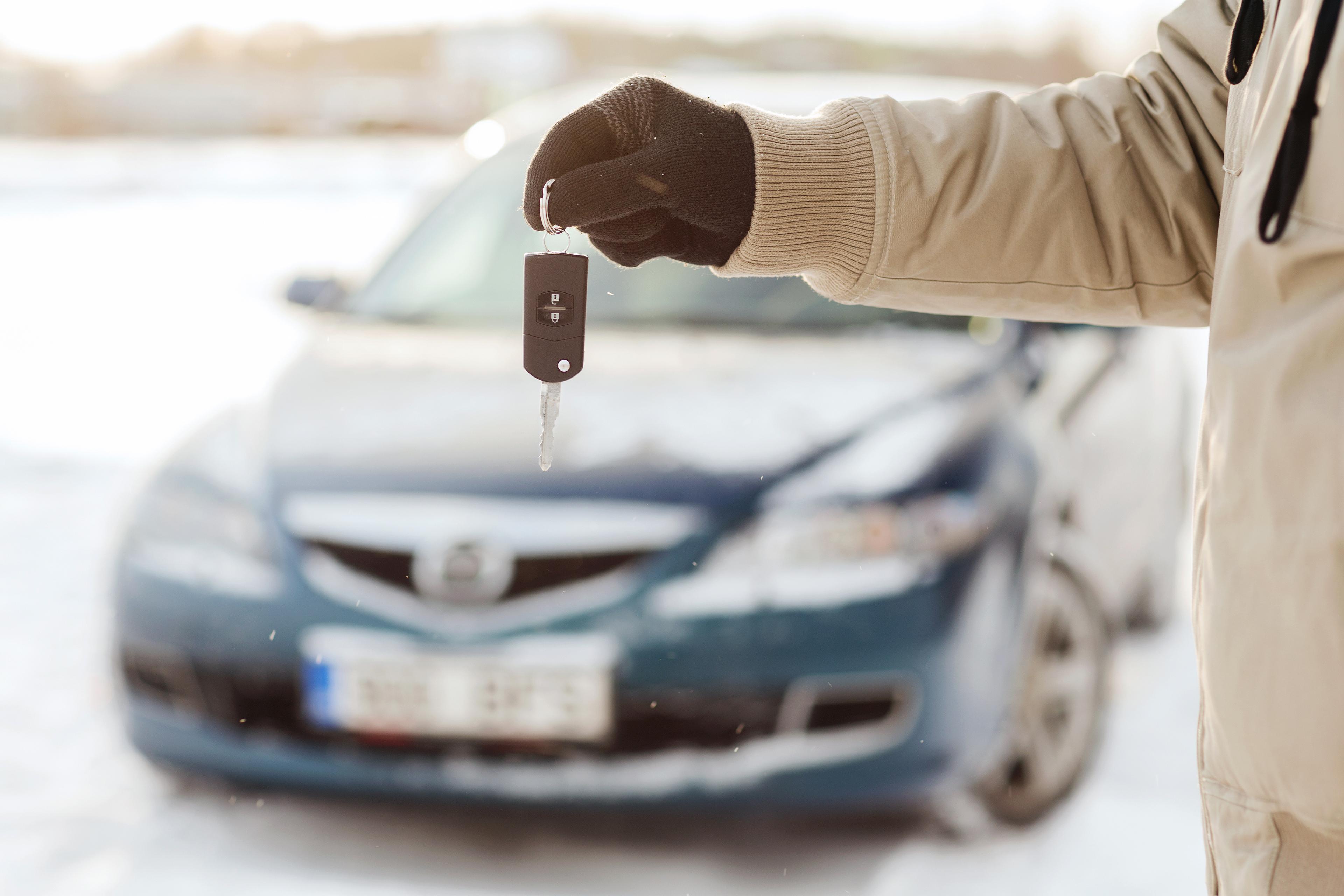
The biggest advantage of buying a salvage title car is its lower price. If you need a car but have a limited budget, you can buy a salvaged vehicle for far less than you would have to pay for a car with a clean title.
Moreover, salvage titles can be issued due to all kinds of damage. This means that in some rare cases, salvage cars may only have minor or cosmetic damage (e.g., damaged by hail) that is relatively inexpensive to repair. If you’re lucky, you may still get a high-value vehicle at a fraction of its market value, but this may require some serious digging.
Overall, it's crucial to thoroughly inspect the vehicle with a salvage title, understand the extent of the previous damage, and assess whether the repairs have been properly made or how much you will still have to invest in it. Considering these factors can help you decide if a salvage car is the right choice for you.
Buying a used car? Learn about its past to avoid issues
Buying a used car requires careful research, inspection, and understanding potential risks, especially if it has a salvage title. Whether you want to purchase a promising salvaged car or avoid a bad deal, here are a few essential tips to help you do it.
Check the car’s history
Getting a vehicle history report is crucial when buying a used car, as it can help you uncover its weak spots. In this case, it can also show whether a vehicle has a salvage or any other title brand.
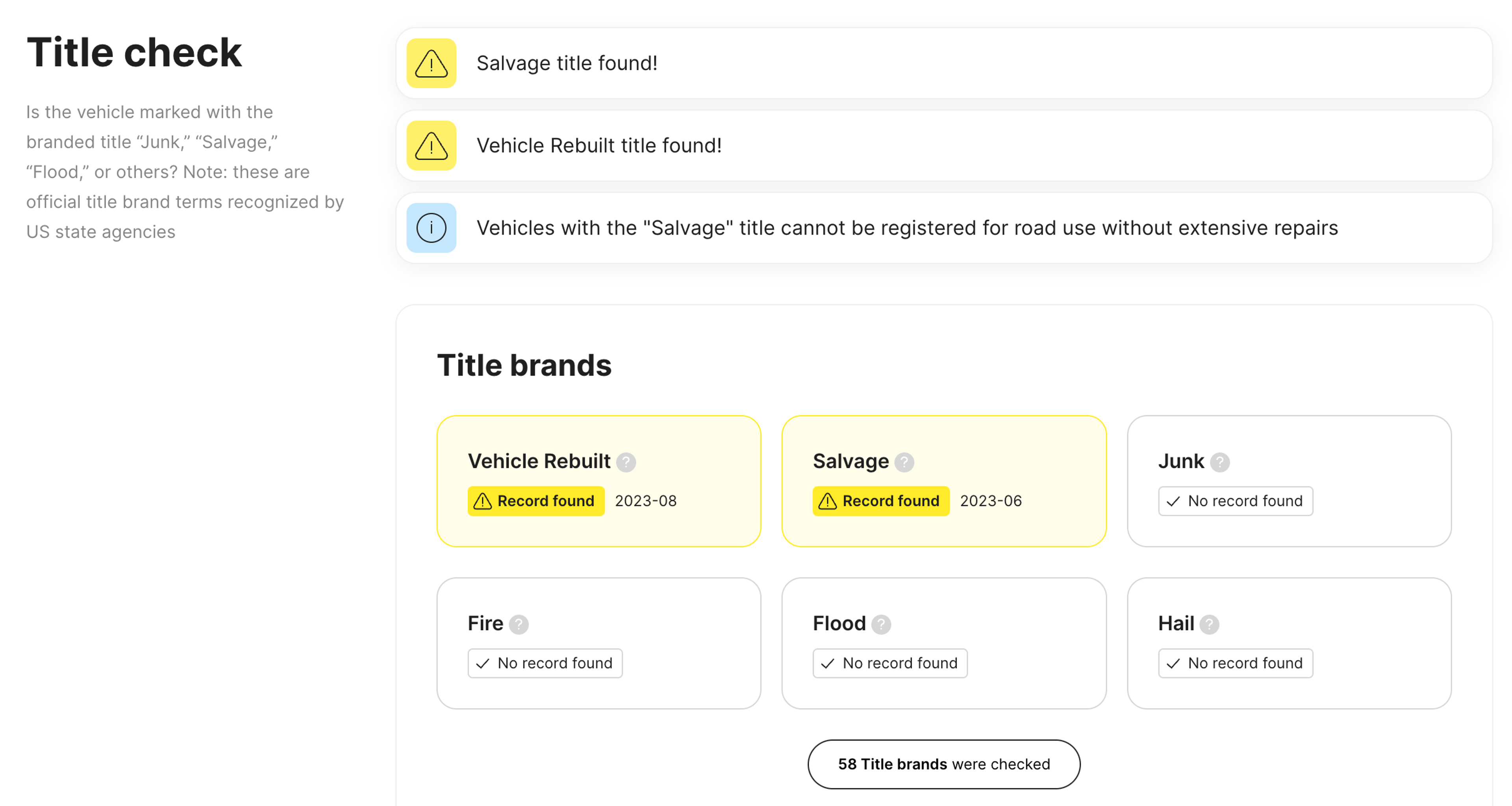
Besides title checks, a vehicle history report can provide other essential information, such as damage records, mileage, historical photos, ownership changes, financial and legal status, and more, allowing you to make a more informed decision about purchasing the vehicle.
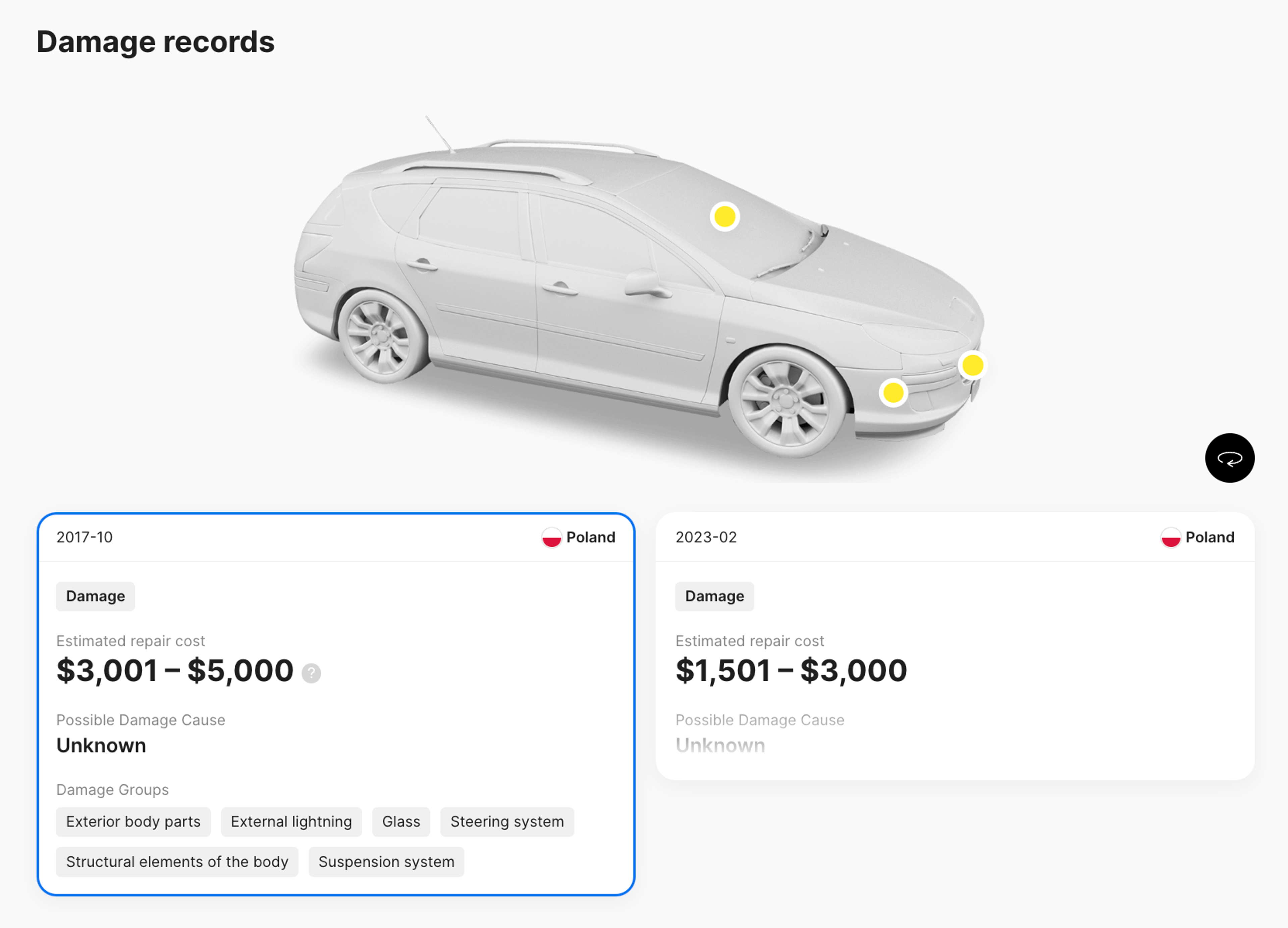
For instance, the report can show accidents the vehicle has been involved in, including their severity and the areas of the vehicle that were damaged. Frequent or severe accidents can indicate potential structural weaknesses or ongoing mechanical issues.
Knowing this, you can better understand the actual condition of a car and ask the right questions once you bring it to a professional mechanic.

Check your VIN
Avoid costly problems by checking a vehicle's history. Get a report instantly!
Ask for original service records
Even if you know that a car has a salvage title, original service records can still provide valuable information about the extent of the damage and the quality of repairs already made.
This can help you assess whether the repairs were done professionally and identify any underlying issues that may impact the vehicle’s safety and performance. Therefore, you may be able to anticipate potential maintenance or repair needs in the future and decide whether to proceed with the purchase.
Inspect a salvage title vehicle
One of the biggest mistakes used car buyers make is skipping a professional inspection. When the vehicle has a salvage title, bringing it to a qualified mechanic is even more important.
Mechanics generally have the expertise and experience to detect issues with salvage cars. They can evaluate the vehicle’s structural integrity and safety systems and look for signs of replaced parts or repainted areas. At this point, you can also draw attention to the issues you suspect from checking the vehicle’s history.
A mechanic can inspect the salvage vehicle and provide an estimate of the repair costs needed to restore it to roadworthy condition, which can help you decide if it’s worth it.
What if you buy a salvage car without knowing it?
Sellers are generally required to notify a potential buyer that the vehicle has a salvage title. If this didn’t happen and you ended up with a totaled vehicle without knowing it, you may have a legal recourse (although this can vary depending on the laws and regulations of each state).
Consider consulting with a legal advisor to understand your rights and recourse options. Depending on the circumstances, you may be able to seek compensation from the seller or explore options for returning the vehicle and getting your money back.
However, if you bought a car from a private seller, you may need to prove that they sold a salvage vehicle without proper disclosure and did so “knowingly.” With a dealership, it’s a bit easier, as it’s difficult to see how they would not know about the salvage title.
FAQ
Can I insure a car with a salvage title?
No, because it hasn’t been repaired and can’t be legally driven. You can insure a previously salvaged car if you have it fixed and receive a rebuilt title. However, it can be more challenging and expensive, as many insurers tend to offer limited coverage at higher premiums.
Are salvage title cars safe to drive?
Salvage title cars can be safe to drive, but it largely depends on the extent of the damage they sustained and how well they were repaired. If the repairs were done properly and the car had passed all necessary safety inspections, it's generally considered safe to drive.
How does a salvage title affect a car's resale value?
Salvage title cars typically have substantially lower market values than similar vehicles with clean titles. The reduced value reflects the perceived risk associated with buying a vehicle that has undergone severe damage.
Can I remove a salvage title from a vehicle?
You can’t turn a salvage title into a clean title. However, a car with a salvage title may receive a new, rebuilt title, which suggests that the vehicle was repaired, properly inspected, and is now safe to drive.